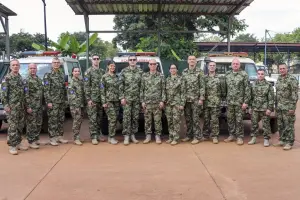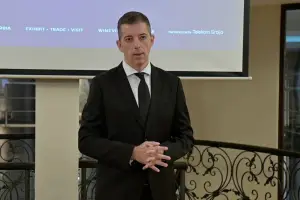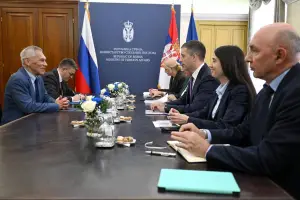- Serbia
Get to know Serbia
- Citizens
Culture and science
Health services
Pension and disability insurance
- Business
Employment
Economy
- Media
- Government
- Contact
Keep in touch
Contact form
Back
Keepin touch
Whether you have a question, comment, suggestion or any problem in the purview of the government, send us your message and we will try to respond as soon as possible. If your problem is not in our purview, we will forward your message to the relevant institution.
Q:
A:
Round table on small rural households in Serbian rural economy held
Belgrade,
7 September 2007
A round table discussion on small rural households in Serbian rural economy was held today in the Palace of Serbia, in the organisation of the Serbian Ministry of Agriculture, Forestry and Water Management and the United Nations Development Programme (UNDP).
The round table was attended by Serbian Minister of Agriculture, Forestry and Water Management Slobodan Milosavljevic, deputy standing representative of the UNDP Rasa Buric, representatives of the Ministry of Economy and Regional Development, a team of government officials, representatives of NGOs, as well members of regional agencies and domestic experts on rural development.
Minister Milosavljevic stressed in his speech that in the previous period there was a lot of talk, but very little was done in the area of rural development. He added that earlier mistakes have been partially corrected but a lot of intensive work remains to be done.
According to a ministry statement, the round table was held to discuss the study on small rural households in the Serbian rural economy in the framework of upcoming drafting and amendments to the agriculture strategy and rural development which will serve as a basis for programming support to rural development in the period from 2008 to 2013.
Individual aspects of rural development are partially mentioned in the framework of a few national strategies, but at the present Serbia has no integrated policy of rural development.
In the process of planning and directing state funds a coordination system still has not been set up between a number of institutions and subjects which are included in various aspects of rural development, and today’s round table was an opportunity to gather many decision makers who influence policy making in this area, and to open a debate on the subject.
The Ministry states that the rural economy is recognisable as a development concept which resolves key problems in majority of rural areas, and its essence is diversification and development of non-agricultural activities in rural areas.
The rural areas of Serbia are spread over 85% of the country’s territory inhabited by 55% of the country’s population, and these areas form 41% of the GDP.
The category of small rural households is a very large and sensitive group of the population, whose economic and social condition could be in jeopardy in the period of transition, due to inadequate development options and priorities. The number of people in Serbia who own less than three hectares of land and live in rural areas is more than 2 million.
Participants of the round table were presented with a study which shows detailed analysis of the position of precisely this sensitive category. The study made by Professor Dr Natalija Bogdanov, published in Serbian and English is available on the UNDP website. It provides documentation and an analytic basis for a public debate on rural economy in Serbia and offers hypotheses for drafting various development plans.
Today’s gathering showed that it is necessary to establish suitable structures for regulating transition support programmes of the EU intended to resolve specific problems in rural areas in candidate and potential candidate countries, which is a precondition for using them.
Minister Milosavljevic stressed in his speech that in the previous period there was a lot of talk, but very little was done in the area of rural development. He added that earlier mistakes have been partially corrected but a lot of intensive work remains to be done.
According to a ministry statement, the round table was held to discuss the study on small rural households in the Serbian rural economy in the framework of upcoming drafting and amendments to the agriculture strategy and rural development which will serve as a basis for programming support to rural development in the period from 2008 to 2013.
Individual aspects of rural development are partially mentioned in the framework of a few national strategies, but at the present Serbia has no integrated policy of rural development.
In the process of planning and directing state funds a coordination system still has not been set up between a number of institutions and subjects which are included in various aspects of rural development, and today’s round table was an opportunity to gather many decision makers who influence policy making in this area, and to open a debate on the subject.
The Ministry states that the rural economy is recognisable as a development concept which resolves key problems in majority of rural areas, and its essence is diversification and development of non-agricultural activities in rural areas.
The rural areas of Serbia are spread over 85% of the country’s territory inhabited by 55% of the country’s population, and these areas form 41% of the GDP.
The category of small rural households is a very large and sensitive group of the population, whose economic and social condition could be in jeopardy in the period of transition, due to inadequate development options and priorities. The number of people in Serbia who own less than three hectares of land and live in rural areas is more than 2 million.
Participants of the round table were presented with a study which shows detailed analysis of the position of precisely this sensitive category. The study made by Professor Dr Natalija Bogdanov, published in Serbian and English is available on the UNDP website. It provides documentation and an analytic basis for a public debate on rural economy in Serbia and offers hypotheses for drafting various development plans.
Today’s gathering showed that it is necessary to establish suitable structures for regulating transition support programmes of the EU intended to resolve specific problems in rural areas in candidate and potential candidate countries, which is a precondition for using them.
-
 Belgrade, 7 November 2025
Belgrade, 7 November 2025Gratitude to Italy for continuous support for Serbia’s European path
-
 Belgrade/Doha, 4 November 2025
Belgrade/Doha, 4 November 2025Serbia among signatories of new declaration on social development in Doha
-
 Belgrade, 3 November 2025
Belgrade, 3 November 2025Assessments of Serbia’s reform efforts should be based on realistic indicators
-
 Belgrade, 28 October 2025
Belgrade, 28 October 2025Improving comprehensive cooperation between Serbia, Ireland
-
 Belgrade, 28 October 2025
Belgrade, 28 October 2025Rotation of Serbian Armed Forces medical team in mission in Central African Republic
-
 Belgrade, 22 October 2025
Belgrade, 22 October 2025Police working intensively to clarify incident outside parliament
-
 Belgrade, 8 October 2025
Belgrade, 8 October 2025Strong protest over continued arming of Priština, violation of UN Security Council Resolution 1244
-
 Topola, 7 October 2025
Topola, 7 October 2025Diplomatic corps visits Topola, Oplenac
-
 Belgrade, 6 October 2025
Belgrade, 6 October 2025Continuation of intensive cooperation with Russia in all areas of mutual interest
-
 Belgrade, 6 October 2025
Belgrade, 6 October 2025Boat carrying several Chinese citizens capsizes on Danube
